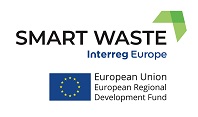News
SMART WASTE
 The SMART WASTE project – Innovation in Waste Management Policies – aimed at improving public policy instruments supporting innovation within waste management procedures, both in terms of new approaches and new technologies. The project looked at both new approaches and at new technologies applied in reusing, in reducing, recycling, and recovering the waste.
The SMART WASTE project – Innovation in Waste Management Policies – aimed at improving public policy instruments supporting innovation within waste management procedures, both in terms of new approaches and new technologies. The project looked at both new approaches and at new technologies applied in reusing, in reducing, recycling, and recovering the waste.
Project funded under the European Regional Development Fund of the European Union, 2019 - 2023
Highlight
The SMART WASTE Final Conference took place in Sofia to showcase the efforts made by the project’s cities and regions to improve their waste management practices and strategies. One key result is 13 Good Practices which contributed to the INTERREG policy learning platform and in continuous capacity building and learning of the project partners involved.
{slider WHY SMART WASTE?}
Local, regional, and national authorities are working hard to manage in an always more sustainable way their waste and implement a comprehensive and circular approach. They consider new approaches and technologies to reduce, reuse, recycle, and recover waste. They attempt to fit these into a comprehensive and circular approach.
But what are the results of their actions? Are these measures having a concrete impact? Could their implementation be more effective? The SMART WASTE project was born to answer these questions.
{slider THE PROJECT}
The SMART WASTE project aimed at improving public policy instruments supporting innovation within waste management procedures, both in terms of new approaches and new technologies. The project looked at approaches applied in reducing, reusing, recycling, and recovering waste. It looked at how regional policies had applied approaches that emerged over recent years, such as the circular economy concept. It also looked at investments in innovative technologies to support these approaches. It looked at what new technologies had been tested and applied, thanks to public funding sources, and what impact they had had.
{slider ACTIVITIES}
SMART WASTE was divided into two phases. In the first phase of the project, regional project partners evaluated innovation in their waste management policies and identified Good Practices and failures through interregional exchange events. Partners then developed a two-part Action Plan with short and long-term measures to improve their policies. During the second phase of the project, they implemented their Action Plan and finally showed their results during a high-level political event.
ACR+ was the Advisory Partner, helping to consolidate the project knowledge base and supporting the interregional exchanges. In its advisory role, ACR+ provided thematic input by bringing in external best practices and experts to the different events. In addition, ACR+ coordinated communication activities to ensure consistent and efficient dissemination of the project and the programme.
{slider PARTNERS INVOLVED}
The coordinator of the SMART WASTE project was ARRR*, Resources Recovery Regional Agency of the Tuscany Region (IT), and its project partners were:
-
ACR+, Association of Cities and Regions for Sustainable Resource Management (BE)
-
BAMEE, Bulgarian Association of Municipal Environmental Experts (BG)
-
KRATC, Klaipeda Regional Waste Management Centre (LT)
-
Municipality of Apeldoorn (NL)
-
Municipality of Kolding (DK)
*ACR+ member
{/sliders}











